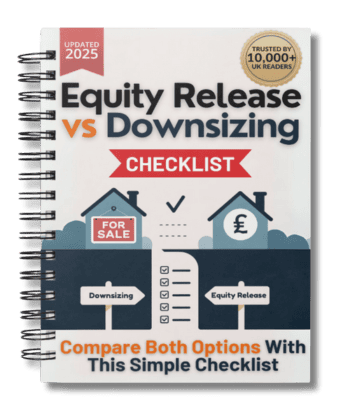
Can You Obtain Equity Release With Bad Credit?
 Be aware. Equity release comes with drawbacks which are important to think about. Lifetime mortgages are secured loans. Compound interest means the amount you owe can grow quickly. Equity release reduces your estate's value and may impact means-tested benefits.
Be aware. Equity release comes with drawbacks which are important to think about. Lifetime mortgages are secured loans. Compound interest means the amount you owe can grow quickly. Equity release reduces your estate's value and may impact means-tested benefits.Key Takeaways...
- Equity release is accessible even with bad credit, as it does not typically require credit checks as part of the process; however, it could potentially impact the interest rates available to you.
- Options like lifetime mortgages and home reversion plans typically do not scrutinise your credit, and boosting your home's condition could enhance your chances for equity release — regardless of credit status.
- Interest rates are generally consistent irrespective of credit history, though they vary by product and provider.
It can be a great way for older homeowners to access equity from their property, but are you worried about equity release with bad credit?
Just what is considered bad credit, how will it affect your eligibility for equity release, and the steps you can take to improve your chances of approval are all important questions when considering equity release.
In This Article, You Will Discover:
The EveryInvestor team has gathered up-to-date equity release information to help you make informed decisions about your retirement finances.
This article will provide information about equity release with bad credit and guide you through the process.
What Are Equity Release Plans?
Equity release, suitable for individuals aged 55 and above, offers a way to harness the equity in their home for financial gain.

This option is particularly valuable for those needing additional funds for activities like travelling or pursuing hobbies in retirement.
The main equity release plans are lifetime mortgages and home reversion plans.
With a lifetime mortgage, you borrow against your home, and the loan is repaid when the house is sold.
Home reversion, on the other hand, involves selling part of your home in return for a lump sum or regular payments, whilst still living there.
What is Considered Bad Credit?
What is considered bad credit can differ depending on where you live and how you are tracking your credit.
In the UK, a bad credit rating is generally considered to be a score below 580 on the Equifax scale or below 560 on the Experian1 scale.
Your credit score, however, is just one of many factors lenders consider in assessing your creditworthiness.
Can You Get Equity Release with Bad Credit?
Yes, you can get equity release with bad credit, but the process may be more difficult.
Lenders will usually check your credit score and history, but these are not the only equity release lending criteria.
Equity release is a secured loan against your property, so your home’s condition and resale value are usually more important.
Remember that equity release may not be suitable for everyone, and seeking independent financial advice is essential before making any decisions.
In addition to reducing the value of your estate, releasing equity from your home may also affect your entitlement to means-tested benefits.
Is There a Credit Check for Equity Release?
For most equity release products, a full credit check is not required; providers are more interested in your age, property value, and the amount of equity available.
However, they may still review your financial history to identify any severe financial issues, like bankruptcy, that could influence the release terms.
In cases where you have outstanding debts, some providers may insist on using part of the released funds to settle them.
While not a credit check in the traditional sense, this review helps ensure the loan can be serviced without financial complications for either party.
Does Equity Release Affect Your Credit Score?
Equity release generally does not impact your credit score, as it does not require monthly repayments or show up as a typical loan, and since you’re not taking on a regular debt obligation, there’s no ongoing impact on your credit profile.
This makes equity release an attractive option for those concerned about their credit rating.
Using equity release to pay off existing debts, however, can indirectly improve your credit score—reducing outstanding debts lowers your credit utilisation ratio, which could positively impact your score over time.
I Have Equity But Bad Credit: What Are My Options in the UK?
If you have equity in your home but bad credit, there are still options available; equity release can be a viable solution because it’s often based more on the value of your property and age than your credit history.
However, alternatives like remortgaging may be challenging with bad credit, as mortgage lenders usually conduct credit checks.
Some people with bad credit opt for specialist lenders or financial products designed for those with less-than-perfect credit histories, but it’s essential to compare these options to find what works best for your situation.
How Does Bad Credit Affect Equity Release?
Bad credit does not necessarily affect equity release, but it can impact the terms you are offered, potentially leading to higher costs and increased risks.
Some lenders specialise in offering equity release to people with bad credit; however, it is important to carefully compare their terms and understand the potential risks of borrowing from these providers.
Equity Release With Debt
Equity release with debt is possible and can be used to consolidate your debt, but only if recommended by a financial advisor or equity release broker and after considering the potential risks and long-term implications on your finances.

Existing debts, such as a mortgage or loans, will be taken into account by lenders when assessing your eligibility for equity release.
You may still be able to release equity from your property, but you may need to use the funds to repay your existing debts first.
Can You Be Refused Equity Release? Factors to Consider
Yes, it is possible to be refused equity release, though it’s less common than with traditional loans.
Providers may refuse equity release if your property doesn’t meet their criteria, such as location or condition; additionally, if there are significant legal issues tied to the property, it may complicate the process.
Financial history, like an active bankruptcy or unpaid debts, can also affect eligibility. Some providers require debts to be settled as part of the agreement.
Checking with your provider beforehand can help clarify any potential obstacles and ensure you meet the criteria.
Equity Release With Credit Card Debt
Equity release with credit card debt should not be an issue, as your equity release does not need to be repaid every month.
Repaying credit card debt and improving your credit score is a common use of equity release; however, considering the potential risks, such as higher overall costs and reduced inheritance for your heirs, is essential.
Equity Release Whilst in Arrears
Equity release whilst in arrears is possible; however, be aware that any debt secured against your property must be repaid using your equity release funds, which may reduce the amount available for your intended purposes.
Once this debt is settled, you will receive the balance to use as planned.
Equity Release With a County Court Judgement
Equity release with a County Court Judgement (CCJ)2 will not be approved until any judgement noted on your credit score is settled.
Rules will differ depending on the amount owed.
A CCJ must either be paid...
- Before you are given access to your equity release funds.
- Prior to the transfer of the remaining equity to your account, by your solicitor.
- Within six months (generally) of you receiving your equity release income.
Equity Release With an Individual Voluntary Arrangement (IVA)
Equity release with an Individual Voluntary Arrangement (IVA)3 is possible if your home's equity is worth £5,000 or more, but be cautious of potential risks, such as the need to commit to repaying debts with some of the released equity.
Whilst equity release can help you end your IVA after five years, your debt repayments may extend for an additional year without sufficient equity, so consider the potential risks and long-term consequences.
Equity Release With a Charging Order
Equity release with a charging order4 is possible, but your lender will require that the charging order be settled with some of the proceeds.
This is because your equity release lender will insist on being the only charge or burden against your property’s HM Land Registry5 entry.
How to Get Equity Out of Your Home With Bad Credit: Step-by-Step Guide
Getting equity out of your home with bad credit can be straightforward with equity release; start by consulting with a qualified equity release adviser who understands your specific needs.
They can assess your property’s value, explain your options, and guide you through eligibility checks, and once approved, the provider will arrange for a valuation of your home and finalise the offer.
After the paperwork is complete, you’ll receive the funds, often within a few weeks.
How Does Bankruptcy Affect an Equity Release Plan?
Bankruptcy affects an equity release plan by rendering you unable to qualify for a plan with any lender until your bankruptcy is discharged.

Even after your bankruptcy has been discharged, a record of it will remain on your file.
Your equity release application should not be affected at this point, provided you have been fully released from any debts.
Remember...
Your broker and lender will still need to be informed of any previous bankruptcies, regardless of how long ago they took place.
Equity Release Without a Credit Check: Is It Possible?
No, you generally cannot obtain equity release without a credit check, as this is part of your lender’s assessment process.
However, some lenders may be more lenient than others regarding your credit history.
There are also specialist equity release providers who offer products to people with bad credit.
Steps to Obtaining Equity Release With a Bad Credit Rating
The steps to obtaining equity release with a bad credit rating should start with checking your credit report and addressing any issues affecting your score.
An equity release advisor or broker can guide you through the equity release process and help you mitigate any possible risk.

A more detailed look at the steps to obtain equity release with bad credit...
1. Check Your Credit Report
You can check your credit report with a credit reference agency such as Experian or Equifax.
These agencies usually offer a free 30-day trial, giving you access to your full credit report.
2. Speak to an Equity Release Broker or Adviser
A broker or advisor who specialises in securing equity release for clients with bad credit will be able to advise you on ways to improve your credit score.
A broker will also handle your application on your behalf.
3. Find the Right Provider for You
Find the right provider, as a client with a bad credit score may only be accepted by some equity release lenders.
An experienced equity release advisor or broker can help you identify suitable providers, including those who specialise in offering equity release products to clients with bad credit.
Mortgages for Over 65 With Bad Credit: Alternatives to Equity Release
For those over 65 with bad credit, specialised mortgage options may still be available as alternatives to equity release—lenders offering retirement interest-only mortgages (RIOs) or lifetime mortgages are typically more flexible.
These options often include interest-only payments, allowing you to retain equity while meeting monthly repayments.
Comparing these products with equity release can help you find the best fit, especially if you want to keep more control over your home’s equity.

Common Questions
Your credit rating matters when you want to release equity because equity release providers use it to assess your application.
A poor credit rating could mean higher interest rates or a smaller loan.
Some equity release providers may accept bad credit, but that depends on the severity of the credit issues and the provider’s specific criteria.
If you fail a credit check with an equity release provider, they may either decline your application or offer you a smaller loan or less favourable terms.
Yes, you can be refused equity release if you do not meet the provider’s eligibility criteria.
A charging order is a legal mechanism that allows a creditor to secure a debt against a property.
A charging order could affect your ability to qualify for equity release.
Equity release providers may accept credit issues such as missed payments or CCJs, but they typically prefer applicants with a good credit history.
Equity release itself does not affect your credit score, but it could affect your eligibility for other financial products.
Equity release does not affect Pension Credit7, as it is not considered income or savings.
A credit rating below 580 is generally considered bad in the UK.
Yes, it is possible to qualify for equity release with bad credit.
Unlike traditional mortgage applications, equity release is not solely dependent on credit history. Lenders primarily consider the value of your property and your age.
However, having bad credit may limit your options and affect the interest rates offered to you.
Whilst bad credit does not necessarily disqualify you from equity release approval, it can have an impact.
Lenders may perceive individuals with bad credit as higher risk borrowers, resulting in limited options and higher interest rates.
However, each case is unique, and it is advisable to consult with a specialist who can guide you through your options based on your specific circumstances.
In Conclusion
Equity release can be a valuable financial tool for those looking to access the wealth tied up in their homes.
For homeowners with bad credit, securing this type of funding may seem daunting; however, by exploring various equity release products, seeking professional advice, and carefully considering the pros and cons, finding a solution that works for your unique circumstances is possible.
Lenders will consider various factors, including your credit score and history, as well as other debts and financial commitments.
You can improve your chances of accessing an equity release plan by understanding what is considered bad credit, addressing any issues in your credit report, and seeking advice from a financial advisor or equity release broker.
With perseverance and a well-informed approach, obtaining equity release with bad credit and securing a more comfortable financial future is possible.

Found an Error? Please report it here.





 100% private. No pressure. Just friendly guidance.
100% private. No pressure. Just friendly guidance.



